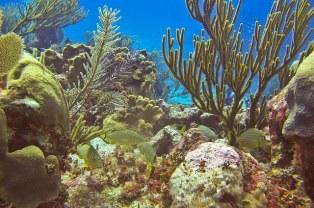
An international research team examined how pH and temperature levels, predicted for the next century, affected the growth and physiology of two dominant Cayman Island corals, Acropora palmaae and Porites astreoides. Both species inhabit the outer reef where environmental conditions remain relatively stable throughout the day while P. astreoides is also found in adjacent shallow lagoon habitats that also contain seagrass beds. This latter high variance environment routinely exposes coral to conditions predicted for reefs over the next 50 – 100 years.
“Coral reefs worldwide are increasingly under threat from ocean warming and acidification. Habitats with inherently high-variance temperature and pH conditions have been proposed as a potential refuge for corals from climate change,” says lead author Dr Emma Camp from the University of Technology Sydney (UTS), Climate Change Cluster.
“However our research doesn’t support this. Instead we show that calcification, the fundamental process dictating coral growth, was impacted equally by future open ocean climate scenarios for populations from high-variance seagrass and low-variance reef habitats.”
The researchers point out that under present day conditions the seagrass habitat provides a “buffering service” against decreasing calcification rates. However, if over time these highly variable systems experience the same level of environmental change as the rest of the reef, as seems likely, then any advantage acclimatised corals have won’t offset the detrimental impacts caused by ocean warming and acidification.
Although both coral species experienced the same net decrease in calcification the research team observed that the physiological mechanisms driving the decline were very different warranting further investigation.
Apart from scientists from UTS the collaboration also included scientists from the Universities of Essex and Miami and NOAA. ARC Future Fellowship funding supported Associate Professor David Suggett’s involvement in the research. Associate Professor Suggett leads the Future Reefs research program at UTS.
Publication details:
Camp E, Smith DJ, Evenhuis C, Enochs I, Manzello D, Woodcock S, Suggett DJ. 2016 Acclimatization to high-variance habitats does not enhance physiological tolerance of two key Caribbean corals to future temperature and pH. Proc. R. Soc. B 20160442.

